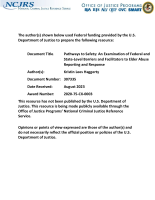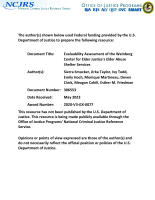Adult Protective Services
APS Investigation Across Four Types of Elder Maltreatment
Developing a Model for Providing Feedback to Reporters of Elder Abuse
Reliability and Validity of the Lichtenberg Financial Decision Screening Scale
Cross-validation of the screening scale in an adult protective services sample
Developing an Actuarial Risk Assessment to Inform the Decisions Made by Adult Protective Service Workers
Pathways to Safety: An Examination of Federal and State-Level Barriers and Facilitators to Elder Abuse Reporting and Response
Evaluability Assessment of the Weinberg Center for Elder Justice's Elder Abuse Shelter Services
Defining and Studying Elder Abuse Polyvictimization
NIJ Social Science Analyst Yunsoo Park shares her knowledge about elder abuse, a widespread issue in the U.S. and around the world, particularly polyvictimization — the experience of a range of different types of abuse and maltreatment. As much as 11% of community-residing older adults experienced some form of abuse or mistreatment in the past year. Yunsoo discusses risk factors, difficulties in defining and studying elder abuse polyvictimization, and strategies for intervention and prevention. Stacy Lee Reynolds, a Communications Assistant with NIJ, hosts.
Evaluation of the Detection of Elder Mistreatment Through Emergency Care Technicians Project Screening Tool
Improving forensics: Characterizing injuries among community-dwelling physically abused older adults
Who is in the revolving door? Policy and practice implications of recurrent reports to adult protective services
Pent-up demand for care among dual-eligible victims of elder financial exploitation in Maine
A randomized-control trial testing the impact of a multidisciplinary team response to older adult maltreatment
Abuser Risk Measure: Reports by Alleged Victims to Adult Protective Services
Socioecological indicators of senior financial exploitation: an application of data science to 8,800 substantiated mistreatment cases
A Skeletal Atlas of Elder Abuse: Establishing Markers of Physical Abuse and Developing a Digital Diagnostic Tool for Education and Screening
Barriers in Detecting Elder Abuse Among Emergency Medical Technicians
Development of Short-form Measures To Assess Four Types of Elder Mistreatment: Findings From an Evidence-based Study of APS Elder Abuse Substantiation Decisions
Enhancing the Safety of Elderly Victims After the Close of an APS Investigation
Elder Abuse Decision Support System - Field Test Outcomes, Abuse Measure Validation, and Lessons Learned
Houston and Harris County Develop Partnership To Combat Elder Abuse
Financial Exploitation Intervention Team Evaluability Assessment
Elder Abuse: How Much Occurs and How Do We Measure It?
NIJ Conference Panel
Panelists will present NIJ research on elder mistreatment in noninstitutionalized adults as well as tools for measuring the financial exploitation and psychological abuse of the elderly. A recently completed telephone survey of more than 6,500 older adults living in the community provides the most accurate estimates of the prevalence and incidence of physical, sexual, financial and emotional elder abuse. A second study used state-of-the-art science methods to develop a tool that measures the financial and psychological abuse of elders.
Prosecuting Cases of Elder Abuse
This panel will feature NIJ-funded research that has direct, practical implications for the prosecution of elder abuse cases. Panelists will present findings from a study of prosecutors in three states that examined the factors that influenced their decisions to prosecute elder financial abuse cases. The panel will also provide the results from an evaluation of five innovative court-based models that target perpetrators of elder abuse.





